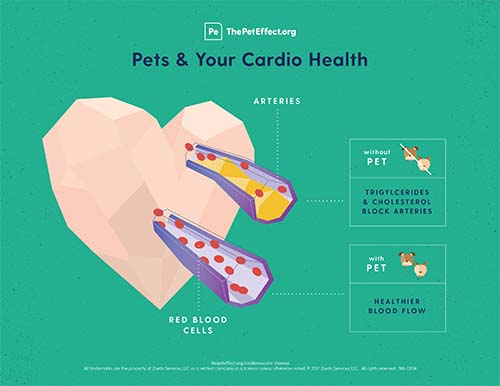Orlando, F.L. (January 16, 2022) — The Human Animal Bond Research Institute (HABRI) and Zoetis announced today the results of a survey of 16,000 dog and cat owners and 1,200 veterinarians across eight countries and four continents. The research shows that the human-animal bond is strong, that pets positively impact their owners’ health, and that stronger bonds are connected to improved veterinary care around the world.
“When 95 percent of pet owners globally consider their pet a part of their family, and 98 percent reported that they have personally experienced health benefits from having a pet in their lives, we have documented more comprehensively than ever before that the human-animal bond is universal across countries and cultures,” said Dr. Mike McFarland, DVM, DABVP, Global Chief Medical Officer of Zoetis and Chair of the HABRI Board of Trustees.
Survey participants included dog and cat owners in eight countries: the United States, the United Kingdom, France, Germany, Spain, Brazil, Japan and China. Pet owner participants in the survey were the primary caregivers of their pets, and the samples were nationally representative by gender, age and region. In addition, 1,200 veterinarians across these same countries participated in this research.
Key findings show that the human-animal bond is universally valued and recognized among pet owners:
- 95% consider their pet a part of their family
- 92% say there’s no reason they would ever be convinced to give up their pet
- 90% say they have a close relationship with their pet
- 86% would pay whatever it takes if their pet needed extensive veterinary care
- 76% say they would make major life changes for their pet, if necessary
In addition, pet ownership is strongly linked to improved human health, with the vast majority of pet owners around the world having personally experienced health benefits from the human-animal bond. The findings show that:
- 87% have experienced the mental health and/or physical health benefits of the human-animal bond
- Virtually all pet owners around the world (98%) reported at least one specific benefit to their health from their pets including increased happiness, reduced loneliness, and decreased stress
To more precisely measure the human-animal bond among pet owners, a new scale called the Human-Animal Bond Score (HABSCORE) was developed that expands on previous scientifically-validated scales. The HABSCORE examines the human-animal bond across four distinct dimensions: attachment, humanization, commitment, and integration. The total average HABSCORE is high at 57.9/70.0, indicating the human-animal bond is strong globally. The survey found no strong cultural differences in terms of how the bond is experienced and expressed. The researchers divided respondents into three HABSCORE tiers – Low (Less than 55), Mid (55-62), High (63 or more) – to look at how the relative strength of the bond can impact human and animal health.
“The strength of the human-animal bond in pet owners strongly correlated with higher rates of veterinary treatment for both preventive care and specific conditions,” said Steve Feldman, President of HABRI. “This is the strongest evidence to date showing the impact of the bond for veterinary medicine.”
Key Findings on Veterinary Care Include:
There is a clear correlation between the strength of the bond and better veterinary care for pets.
- The stronger the bond, the higher number of annual vet visits. Global percentage of pet owners that visit the veterinarian two or more times per year:
- 71% – Higher Bond Tier
- 62% – Mid Bond Tier
- 45% – Lower Bond Tier
- Highly bonded pet owners also are significantly more likely to report that they provide their pet with preventive care, when compared to pet owners in the lower third of the HABSCORE Scale, including:
Among Dog Owners
- Flea/tick/worm preventatives (76%, +10%)
- Vaccinations (78%, +12%)
- Brushing Teeth (44%, +19%)
- Diagnostic screening (26%, +14%)
Among Cat Owners
- Flea/tick/worm preventatives (62%, +9%)
- Vaccinations (63%, +15%)
- Brushing Teeth (22%, +13%)
- Diagnostic screening (23%, +14%)
- Highly-bonded pet owners are most likely to have consulted a veterinarian for specific symptoms experienced by their pet, when compared to pet owners in the lower third of the HABSCORE Scale, including:
Among Dog Owners
- Gum issues (82%, +18%)
- Abnormal itching (77%, +19%)
- Weight loss (68%, +17%)
- Decreased appetite (68%, +12%)
- Difficulty going up or down stairs (65%, +21%)
Among Cat Owners
- Gum issues (84%, +25%)
- Skin redness (78%, +31%)
- Decreased appetite (71%, +17%)
- Weight loss (70%, +19%)
- Hair loss (64%, +27%)
Veterinarians believe in the importance of the human-animal bond for their practice and profession. Eighty-nine percent of veterinarians globally believe a strong human-animal bond increases pet welfare, and 95% credit the human-animal bond as the reason they entered (or joined) the profession.
Key results from veterinarians globally include:
- 81% of veterinarians are aware of the scientific evidence showing mutual health benefits from the human-animal bond
- 71% believe discussing the human-animal bond is valuable
- 43% talk to their clients about the science behind the human-animal bond
- 58% believe talking about the human-animal bond encourages clients to provide the best care for their pets
- 53% believe talking about the human-animal bond builds good relationships with their clients
- The majority of veterinarians would be interested in human-animal bond certification or CE. This is particularly high in China (99 percent), Brazil (98 percent), and Spain (86 percent)
“The pandemic has elevated the role of the human-animal bond in people’s lives, and our data shows this is being felt on a global scale, with incredible consequences that can benefit human and pet health worldwide,” Dr. McFarland added. “The direct correlation between the strength of the human-animal bond and better veterinary care means that veterinarians, by communicating and championing the human-animal bond, are critical to the effort and to improving health for both people and companion animals.”
The findings also show a clear correlation between knowledge of the science behind the human-animal bond and the desire to provide better care for pets. When asked about how greater knowledge of the science of the human-animal bond would impact their future behavior:
- 79% of pet owners would be more likely to maintain their pet’s health, including regular check-ups with their veterinarian
- 59% of pet owners said they would spend more money on their pet’s care
- 58% of pet owners say they are familiar with the science behind the human-animal bond
- 48% of pet owners would like to know more about the science behind the human-animal bond
“The findings are overwhelmingly clear that the human-animal bond has the potential to positively impact animal welfare and human health on a global scale,” added Feldman. “And HABRI clearly has a role to play in sharing the science of the human-animal bond with veterinarians and pet owners. We look forward to working with Zoetis and all of our partners to share this information with an international audience. Together, we can make a difference for people and pets worldwide.”
For more information, please visit www.habri.org/international-hab-survey
About the Survey
This study was commissioned in 2021 by the Human-Animal Bond Research Institute (HABRI) and Zoetis and conducted by CM Research Ltd., to gain a deeper understanding of how the human-animal bond is perceived and impacts behavior among pet owners and veterinarians worldwide. 16,140 pet owners and 1,207 small animal veterinarians from eight countries participated in the study, conducted in 2021. All significance tests were done at a confidence level of 95% (p ≤ 0.05).
The Human Animal Bond Research Institute (HABRI) maintains the world’s largest online library of human-animal bond research and information; funds innovative research projects to scientifically document the health benefits of companion animals; and informs the public about human-animal bond research and the beneficial role of companion animals in society. For more information about HABRI, visit www.habri.org.
About Zoetis
As the world’s leading animal health company, Zoetis is driven by a singular purpose: to nurture our world and humankind by advancing care for animals. After nearly 70 years innovating ways to predict, prevent, detect, and treat animal illness, Zoetis continues to stand by those raising and caring for animals worldwide — from livestock farmers to veterinarians and pet owners. The company’s leading portfolio and pipeline of medicines, vaccines, diagnostics and technologies make a difference in over 100 countries. A Fortune 500 company, Zoetis generated revenue of $6.7 billion in 2020 with approximately 11,300 employees. For more information, visit www.zoetis.com.
###
Contact
Jamie Baxter
jamie@theimpetusagency.com
775.322.4022
Christina Lood
christina.lood@zoetis.com
973.822.7249
###





